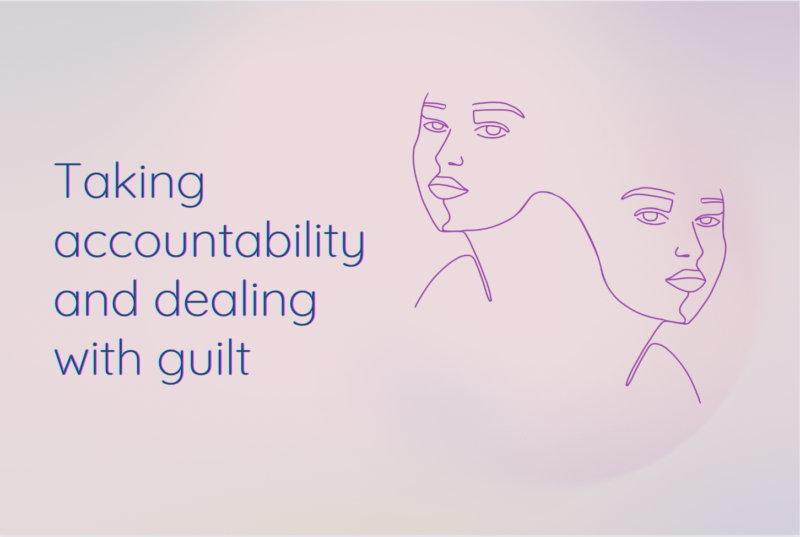Taking accountability and dealing with guilt
Roamers Therapy | June 2023
The phrase “take accountability” is widely understood as synonymous with taking responsibility, whether it be for one’s actions or words that have harmed a person or multiple people. When you are harmed or when your communities are harmed, there are a variety of things you may want such as an apology or justice, but something that most people agree with is that they want the perpetrator of harm to acknowledge the hurt they have caused. However, when you are the one unintentionally engaging in behaviors that are hurtful to others, it can be difficult to figure out how to move forward.
In these situations, acknowledging the consequences of your behaviors means accepting that someone or a group of people are hurting as a result of your actions or words. This is a hard reality to accept. Typically, people like to think of themselves as being good siblings, good friends, good employees, etc. Taking accountability may leave you with feelings of guilt that negatively influences the perception you have of yourself in relationships. However, holding yourself accountable to your actions and recognizing how they may have impacted others does not mean you are a bad person.
There may have been times where you did or said something and later found out that someone was hurt by these actions. There may have been times where you knowingly engaged in an action that would hurt someone and even though you did not want to hurt that person, the action served an alternate purpose for you in that moment. Regardless of the circumstances, here are a couple of suggestions for how to manage your reaction after a hurtful behavior:
- It is okay to feel guilty or bad initially. However, it is important to remind yourself that the past cannot be changed and your focus should be on how to move forward.
- Do not let the action define you. Making a mistake does not make you a bad person. You are human and error is part of the human experience. Sometimes, people want to punish themselves when they feel guilty, but this only creates a cycle of suffering.
- Let those who have been affected know that you are holding yourself responsible for your actions. Be sincere about how you feel and respect that others may not yet be ready to have a conversation.
- Assess what there is to learn from the situation. Can your past actions and consequences inform how you behave in the future? Is there more to learn about yourself? Look at the situation as an opportunity for growth rather than a setback.
At Roamers Therapy, our psychotherapists are here to support you through anxiety, depression, trauma and relationship issues, race-ethnicity issues, LGBTQIA+ issues, ADHD, Autism, or any challenges you encounter. Our psychotherapists are trained in Cognitive Behavioral Therapy, Dialectical Behavioral Therapy, Psychodynamic Therapy, Acceptance, and Commitment Therapy, Person-Centered Therapy, and Gottman Therapy.
Whether you’re seeking guidance on a specific issue or need help navigating difficult emotions, we’re ready to assist you every step of the way.
Contact us today to learn more about our services and schedule a session with our mental health professionals to begin your healing journey. To get started with therapy, visit our booking page.
First, decide if you’ll be paying out-of-pocket or using insurance. If you’re a self-pay client, you can book directly through the “Book Now” page or fill out the “Self-Pay/Out-of-network Inquiry Form.” If you’re using insurance, fill out the “Insurance Verification Form” to receive details about your costs and availability. Please let us know your preferred therapist. If your preferred therapist isn’t available, you can join the waitlist by emailing us. Once your appointment is confirmed, you’ll receive intake documents to complete before your first session.
This page is also part of the Roamers Therapy Glossary; a collection of mental-health related definitions that are written by our therapists.
While our offices are currently located at the South Loop neighborhood of Downtown Chicago and Lakeview on Chicago’s North Side, Illinois, we also welcome and serve clients for online therapy from anywhere in Illinois and Washington, D.C. Clients from the Chicagoland area may choose in-office or online therapy and usually commute from surrounding areas such as River North, West Loop, Gold Coast, Old Town, Lincoln Park, Rogers Park, Logan Square, Pilsen, Bridgeport, Little Village, Bronzeville, South Shore, Hyde Park, Back of the Yards, Wicker Park, Bucktown and many more. You can visit our contact page to access detailed information on our office location.

